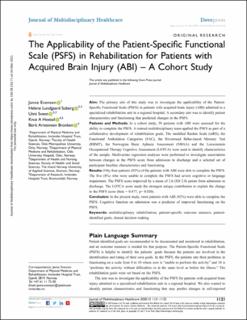The Applicability of the Patient-Specific Functional Scale (PSFS) in Rehabilitation for Patients with Acquired Brain Injury (ABI) – A Cohort Study
Peer reviewed, Journal article
Published version
Permanent lenke
https://hdl.handle.net/11250/2760469Utgivelsesdato
2020-10-09Metadata
Vis full innførselSamlinger
Originalversjon
Journal of Multidisciplinary Healthcare. 2020, 13, (1121-1132). https://doi.org/10.2147/JMDH.S259151Sammendrag
Aim: The primary aim of this study was to investigate the applicability of the Patient-Specific Functional Scale (PSFS) in patients with acquired brain injury (ABI) admitted to a specialized rehabilitation unit in a regional hospital. A secondary aim was to identify patient characteristics and functioning that predicted changes in the PSFS. Patients and methods: In a cohort study, 59 patients with ABI were assessed for the ability to complete the PSFS. A trained multidisciplinary team applied the PSFS as part of a collaborative development of rehabilitation goals. The modified Rankin Scale (mRS), the Functional Ambulation Categories (FAC), the Rivermead Behavioural Memory Test (RBMT), the Norwegian Basic Aphasia Assessment (NBAA) and the Loewenstein Occupational Therapy Cognitive Assessment (LOTCA) were used to identify characteristics of the sample. Multivariate regression analyses were performed to investigate associations between changes in the PSFS score from admission to discharge and a selected set of participant baseline characteristics and functioning. Results: Fifty-four patients (92%) of the patients with ABI were able to complete the PSFS. The five (8%) who were unable to complete the PSFS had severe cognitive or language impairment. The PSFS score improved by a mean of 2.6 (SD 2.0) points from admission to discharge. The LOTCA score made the strongest unique contribution to explain the change in the PSFS score (beta = 0.477, p= 0.020). Conclusion: In the present study, most patients with ABI (92%) were able to complete the PSFS. Cognitive function on admission was a predictor of improved functioning on the PSFS. Keywords: multidisciplinary rehabilitation; patient-identified goals; patient-specific outcome measure; shared decision making. © 2020 Evensen et al.

